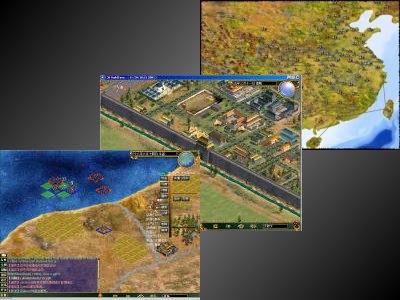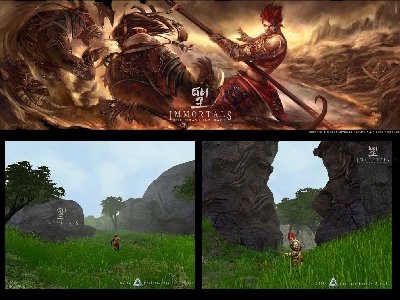For the previous article, I talked primarily to members of the Singapore Infocomm Development Authority (IDA) and other business leaders. In this article, though, we hear from people actually making games in Singapore, making this more of a "report from the trenches" than a strategic overview.
Game Developer Profiles
Inerworx (http://www.inerworx.com), a subsidiary of Addvalue Technologies, is a development shop formed from the ashes of GIME International Pte Ltd., makers of the game Century of Three Kingdoms (C3K, http://3kingdoms.gime.com).

Century of Three Kingdoms by Inerworx
With a team of 5 developers, Inerworx divides its time between their MMOG middleware product, Taliesin, developing new titles, and exploiting the IP picked up in acquisition of GIME. When asked whether they were targeting their games at PC's, consoles, or handhelds, Koon Hock "KH" Teo, COO of Inerworx, said, "Our efforts are essentially server centric and platform independent. We view PC's, consoles and mobile devices as clients." He added, "Our first level of support would be for client PC's with extensions to consoles and mobile devices ... after that."
Inerworx targets its games at the many and varied Asian markets, and has its eye on India in particular, with plans to build a multiplayer cricket game.[1] I asked about the local Singapore market. Did they plan to do much marketing there? It seems not. "We may be the most wired country in the world," KH said, "right after South Korea, but ... playing games on the computer is [still] seen as a trivial use of our time." More on this in a bit.
SL Interactive (http://www.slinteractive.com) started out, according to Adrian Song, Communication and Content Executive, "to develop PC and online games." But, he adds, "we have since switched our focus to mobile games." He said they had found the PC online game market "saturated", and that they liked the "faster turnaround for mobile development." With 16 mobile games in 4 categories (role-playing and simulation, strategy, action, and casual) there is no doubt that SL Interactive's crew of 11 full time developers has been taking full advantage of that "faster turnaround."

SpyNet, Monster Pets, Kung Fu Master & Fun & Fortune by SL Interactive
Adrian said that SL Interactive marketed its games to the larger Asian market. "We try our best," he said, "to have [our games] launched and distributed in as many markets, regions, and even on a worldwide scale if possible."
Envisage Reality (http://www.envisagereality.com) is in the process of completing its first demo: Immortals: The Heavenly Sage, a 3D action game for the PC. Founder Robin Tan shepherded the fledgling company of 10 (5 full time, 5 part-time) through Singapore's Digital Content Development Scheme (http://www.mda.gov.sg/media/digitalcontentdevt.html), a Media Development Authority (MDA) program which provides temporary funding "to support the development of innovative ideas and concepts into real content products such as pilot episodes for original TV animation, technical demo for game series and interactive media projects."

Immortals: The Heavenly Sage by Envisage Reality
Robin told me that the demo for Immortals: The Heavenly Sage should be finished in August 2004. "After which," he said, "we are up to our own to find investor funding to fund the full production." And, like Inerworx and SL Interactive, Envisage Reality is targeting the international market.
Talent Pool? Or Talent Puddle?
Singapore has a tradition of very practical, pragmatic education. Creativity is not discouraged, necessarily, but the micromanaged nature of the government and the society has had a discernible effect. Some think this has contributed to the current, stunted state of Singapore's game development industry.
"Creativity, curiosity, the urge to experiment and the love for risk taking," said KH, who has lived in Singapore all his life, "have been generally bred out of the student population. The higher education schools here are trying their best to churn out individuals who can be dropped into the creative industries like game development, sort of like microwave TV dinners. It has been anything but an unqualified success."
This conservative tendency has led to a shortage of exactly the type of people needed in game development. Singaporean programmers and artists are more used to developing to a fixed set of specifications and business requirements and less accustomed to designing and creating their own specifications--or their own games.
Singapore has recognized its deficiencies in this regard, however, and taken steps to re-introduce creativity and entrepreneurship into its schools and training programs. In the last few years, several new universities and polytechnic schools have opened, providing more access to the arts and creative disciplines. There is even a game design program offered at Nanyang Technological University. Finally, from my conversations with a couple of younger Singaporeans, I don't think the "trivial use of our time" stigma attached to games has affected them as much as it might have affected earlier generations.
While waiting for the schools to catch up, both Inerworx and SL Interactive have adopted an international recruitment strategy. "Because Singapore draws from a wide pool of labour from surrounding countries," KH said, "it is a hurdle that can be overcome if you know where to look and what you are looking for." [2] And Bran Kelly, Chief Technical Officer at Inerworx, added, "We are resolved to the idea of training the people that we bring in."
Adrian had this to say: "The human resource issue has been one of the contributing factors for our decision to focus on mobile games for the time being. Singapore's educational institutions are doing their part in trying to prepare the younger generation with the adequate skills and know-how to enter this industry. However, the talent pool is still very small and it'll take some time before this issue is fully addressed."
When asked if he had had any problems finding qualified team members, Robin told me that "talents are always rare and in demand, especially in Singapore where there are not many game development companies locally." He went on: "What I did was to headhunt for the team members myself. It wasn't easy at all to find the people I had in mind." [3]
The Singapore Scene
When I asked a 15-year-old Singaporean who was in the United States attending a youth-oriented game development program at Stanford University what he thought about game development in Singapore, he said, "I didn't know that there are game developers in Singapore." He then amended himself, saying, "I know there's something there, but I just don't see it."
"There isn't much of game development scene here," said KH, summing up the situation, "as there are just not enough companies here to make a scene. ...For it to grow, we need to have the people and the environment."
Adrian was a bit more upbeat: "The game development scene here in Singapore is definitely growing but compared to countries like Japan, Korea, US and Europe which have...a head start, we still have a long way to go in terms of skill sets and expertise."
Another possible reason for the small local scene is the lack of development funds. "Funding a game development venture is nearly unheard of here in Singapore," Adrian said. "There are many independent code warriors driven by passion but lack the funding to see their projects take off." He added that this is "probably due to the uncertainty of the project's delivery date, its success and its return on investment." As everyone in the industry knows, it's hard to know what will be a hit. And in a conservative arena like Singapore finance, such risk is generally unacceptable.
"Hopefully," Adrian continued, "the mindset of investors will change over time and that they'll see the potential in funding game development projects that will put Singapore on the game development map."
Conclusion
There are challenges facing game developers in Singapore, like a shortage of skilled, experienced staff, limited funds, and a culture that has historically been more conservative than creative. However, this hasn't stopped passionate developers from doing everything they can to get their games made.
At its top levels too, Singapore is determined to conquer these challenges, and is already seeing progress. Add to that the island city-states's access, both physical and digital, to the huge markets of China, India, Korea, Japan, and Malaysia, and you have a potent combination.
My next article dives down into the arena of young hopefuls and the issues they face getting started.
Notes
[1] "Of course," snapped an Indian cricket-widow I met in Singapore after I mentioned Inerworx's planned game. "Cricket. All everybody talks about is cricket." Not a fan, obviously.
[2] Approximately 25% of Singapore's population of 4.2M is foreign workers with work permits.
[3] In the USA, large pools of available talent usually come as a result of a game development shop having a hit, getting big by hiring talent from all over, possibly being acquired by a publisher, and then going bust, scattering experienced programmers and artists into the local workforce. Many of these displaced game developers then form new companies, get publishing deals, and repeat the cycle. There are many examples: Eugene, OR (Dynamix); Chapel Hill, NC (Microprose); Austin, TX (Ion Storm); and who knows how many there are in and around San Francisco and Los Angeles. For better or for worse, Singapore doesn't seem to have gone through this process yet. I'm not sure it's something that should be wished on them, though...
About the Author
David Michael refers to himself as "semi-press" because he doesn't yet have one of those nifty hats with the "PRESS" card stuck in the band. David has attended, spoke at, and covered conferences in the USA, Australia and Singapore, and repeatedly covered the Game Developer Conference for GameDev.net. David is the author of The Indie Game Development Survival Guide (Charles River Media; ISBN:1584502142) and is co-owner of Samu Games (http://www.samugames.com).



